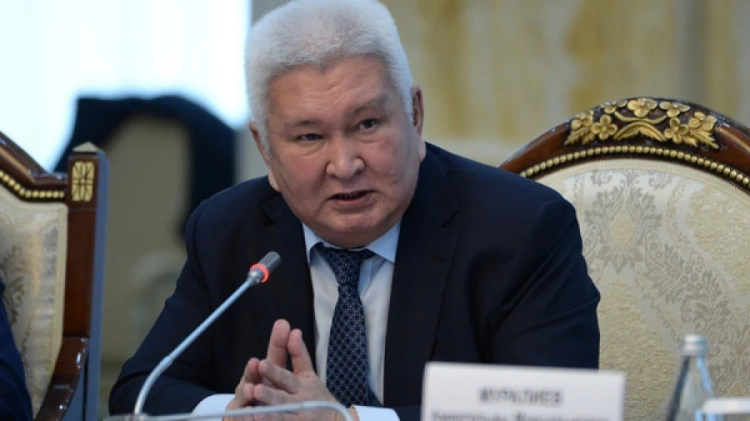Felix Kulov commented on the UN's reaction to the reinstatement of the death penalty in Kyrgyzstan
“According to the Constitution, Kyrgyzstan independently conducts its foreign and domestic policy”
Felix Kulov, who held the position of former Prime Minister and headed the Ministry of Internal Affairs and the National Security Service, expressed his opinion regarding the United Nations' reaction to the possible reinstatement of the death penalty in Kyrgyzstan. Kulov shared his position on social media.
The UN High Commissioner for Human Rights Volker Turk urged the Kyrgyz authorities to immediately abandon plans to restore the death penalty, warning that it would be a serious violation of international norms.
“Kyrgyzstan abolished the death penalty in 1998, and in 2010 adopted a legislative ban after ratifying the Second Optional Protocol to the International Covenant on Civil and Political Rights (ICCPR). This international document requires participating countries to take measures for the complete abolition of the death penalty,” noted Turk. He also emphasized that “no legal system is perfect, and the reinstatement of the death penalty could lead to the death of innocent people.”
The UN Human Rights Committee, which monitors compliance with the ICCPR, noted that since the protocol does not contain provisions for its denunciation, the return of the death penalty would be legally inadmissible for the countries that signed it. This implies that ratification without reservations excludes the possibility of applying the death penalty even for the most serious crimes.
The High Commissioner strongly urged Kyrgyzstan to focus on strengthening legal protection and access to justice, rather than returning to the death penalty.
Thus, the UN's reaction to the initiative to restore the death penalty in Kyrgyzstan has serious legal and moral implications.
Kyrgyzstan respects the work of the UN High Commissioner for Human Rights and Mr. Volker Turk, who has been defending fundamental rights and human dignity for many years.
In the spirit of constructive dialogue, it is worth considering how legal conflicts will be resolved if contradictions arise with international obligations, especially concerning the possible introduction of the death penalty.
As a sovereign state, Kyrgyzstan has the right to independently make decisions on the conclusion, ratification, and denunciation of international treaties. In accordance with Article 1 of the UN Charter and Articles 26 and 54 of the Vienna Convention on the Law of Treaties of 1969, each state determines how ready it is to fulfill international obligations.
The Second Optional Protocol to the ICCPR does not contain provisions for denunciation, indicating the authors' intention to make the obligations permanent and irreversible.
The question is whether the absence of a provision for withdrawal from the protocol can be considered a direct prohibition.
The position of the Human Rights Committee is that this Protocol does not provide for the possibility of withdrawal, viewing it as a document that creates permanent obligations.
According to Article 56 of the Vienna Convention, if a treaty does not contain provisions for denunciation, withdrawal from it is possible only if that was the intention of the parties or if the nature of the treaty implies such a possibility.
It is necessary to gradually clarify how the issue of introducing the death penalty may be applied to Kyrgyzstan, considering its participation in the Second Optional Protocol to the ICCPR.
Kyrgyzstan ratified the ICCPR on October 7, 1994, and joined the Second Optional Protocol on January 5, 2010. The Constitution of Kyrgyzstan explicitly prohibits the death penalty (Article 24, Constitution of the KR 2021).
Thus, Kyrgyzstan is currently legally bound by international obligations prohibiting the application of the death penalty.
Although the Second Optional Protocol does not establish a procedure for withdrawal, it does not contain a direct prohibition on it.
According to the Constitution, international treaties ratified by Kyrgyzstan are part of the legal system (Article 6). However, there is no mention that they take precedence over domestic laws.
Kyrgyzstan, as a sovereign state, has the right to make decisions, including on withdrawal from international agreements, without being limited by any international treaties. The Vienna Convention has a higher status than other acts, including various protocols.
What could be the consequences for Kyrgyzstan in the event of withdrawal from the Second Protocol?
It is assumed that this could negatively affect the country's image and provoke condemnation from the international community.
Thus, it will be necessary to choose between “deteriorating image” and the will of the people if they decide to support the restoration of the death penalty.
How can relations with the UN Human Rights Committee be maintained without ignoring the people's initiative regarding the death penalty?
One possible solution could be to put the question to a nationwide referendum:
“Do you support the need to reconsider the participation of the Kyrgyz Republic in the Second Optional Protocol to the International Covenant on Civil and Political Rights aimed at abolishing the death penalty, to grant the state the right to independently determine the highest measure of punishment for especially serious crimes?”
The legal meaning of this wording is that it does not mention the term “introduction of the death penalty,” which excludes a direct contradiction with the Protocol. The referendum could give the government a mandate to begin the process of reconsidering its participation in the Protocol.
This would be politically and legally correct, avoiding open conflict with the UN, allowing for the expression of the people's will, and creating a legal basis for changes to the Constitution and further appeals to the UN with justification for changed circumstances (increased crime, societal demand, security issues).
It is important to emphasize that Kyrgyzstan remains committed to the fundamental principles of human rights but wants to restore the right of the people to determine the measure of criminal responsibility.
Based on the results of the referendum, after consultation with the UN Committee, amendments can be made to the Constitution stating that “The procedure for applying the highest measure of punishment may be established by law in exceptional cases.”
Then, a provision could be added to the Criminal Code introducing the death penalty only for especially serious crimes (for example, terrorism, child murder, and others that I have already mentioned in other publications).
The introduction of the death penalty, while ensuring all guarantees of a fair trial, is an implementation of the criminal law sanction provided for by international law, as an exceptional measure (see Article 6 of the ICCPR).
This would not mean a departure from international principles; rather, it would reflect the maturity of national legal sovereignty and respect for the opinion of its people.
The question of introducing the death penalty is extremely complex. If it is put to a referendum, serious work will be required to develop preventive measures and improve the functioning of investigative and judicial bodies, so that the imposition of the death penalty occurs only with the mandatory participation of jurors and after exhausting all judicial and constitutional means of protection.
At the same time, Kyrgyzstan, as a responsible member of the international community, will comply with and continue to fulfill its international obligations, acting in the spirit of respect for human rights and the rule of law,” concluded Felix Kulov.
Photo www
Read also:

Legends of Heavy Metal - SEPULTURA
For the first time in the history of Central Asia! SEPULTURA Legends of heavy music, founding...
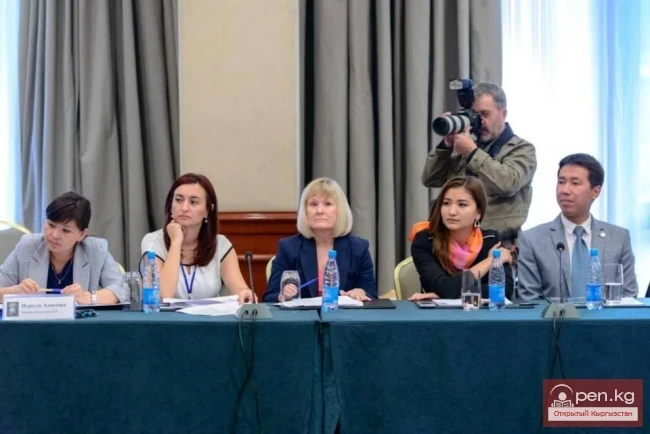
The International Business Council has developed a vision for the development of Kyrgyzstan's economy.
The International Business Council has developed a vision for the development of the Kyrgyz...
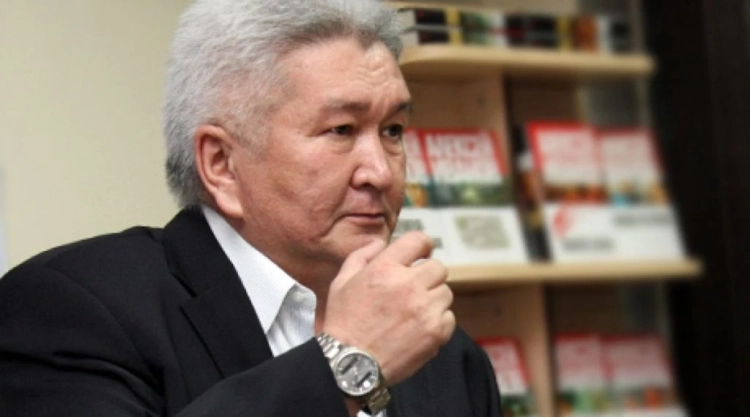
Felix Kulov: Kyrgyzstan is expecting early elections to the Jogorku Kenesh and a referendum in the near future
As reported by Felix Kulov, Kyrgyzstan is expecting two key political and legal events: The first...
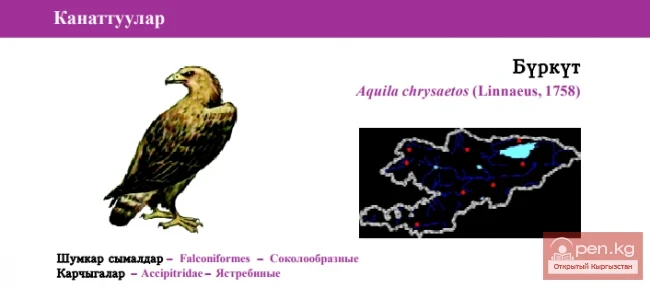
Berkut \ Burkut \ Golden Eagle
Berkut Status: VI category, Near Threatened, NT: R. One of four species of the genus in the fauna...

Aykol Alikjanova became the winner and titleholder of "Miss World Kyrgyzstan 2014."
Aykol Alikjanova became the winner and holder of the title "Miss World Kyrgyzstan 2014"...
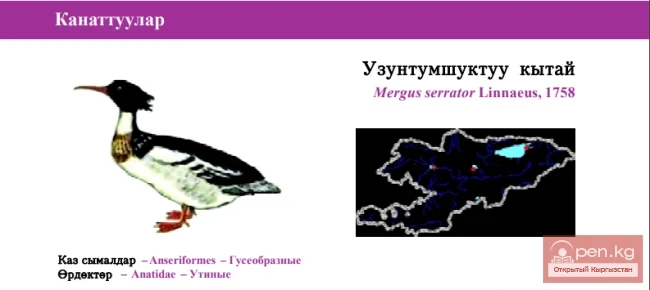
Long-nosed Merganser / Uzuntumshukty Chinese / Red-breasted Merganser
Red-breasted Merganser Status: Category VII, Least Concern, LC. Monotypic species....
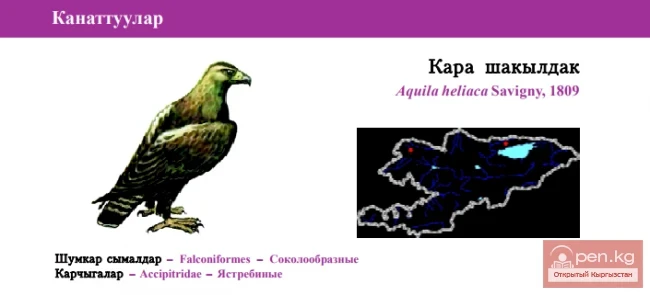
Graveyard \ Kara Shakıldak / Eastern Imperial Eagle
Griffon Vulture Status: V category, Vulnerable, VU, C1. A rare species whose population is...

International Championship International Beauty Championship
October 12-14 International Beauty Championship From October 12-14, 2018, the most anticipated and...
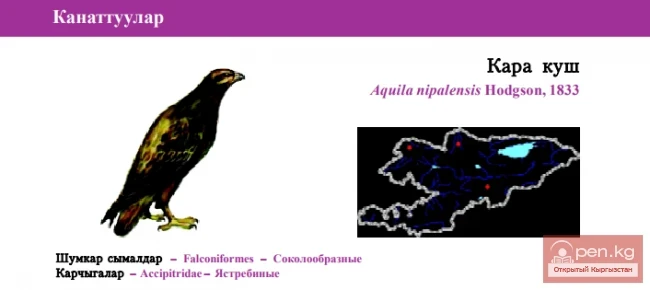
Steppe Eagle \ Kara Kush \ Steppe Eagle
Steppe Eagle Status: VI category, Near Threatened, NT: R. One of four species of the genus in the...
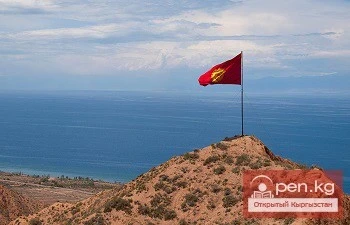
National Geographic Traveler included Kyrgyzstan in the top twenty travel destinations of 2016.
Kyrgyzstan has been included in the top twenty tourist destinations of 2016 by National Geographic...
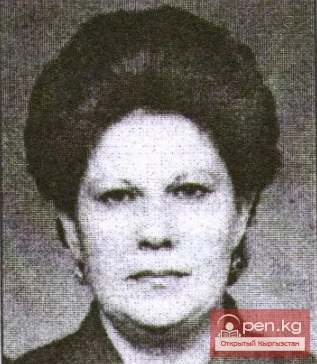
Kononets Irina Evgenyevna
Kononets Irina Evgenievna (1950), Doctor of Medical Sciences, Professor (2002) Russian. Born in...
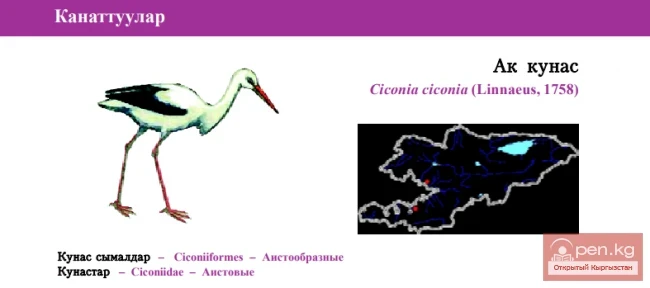
White Stork / Ak Kunash / Белый аист
White Stork Status: IV category, Endangered, EN: R. One of the 2 species of the genus found in...
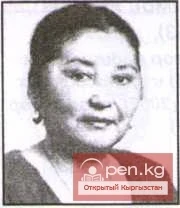
Achylova Rakhат (1941)
Achylova Rahat (1941), Doctor of Philosophy (1988), Professor (1989) Kyrgyz. Born in the village...

Eurasian Eagle-Owl / Chon Uku / Owl
Eurasian Eagle-Owl Status: VII, Least Concern, LC. In Kyrgyzstan, Bubo bubo hemachalanus Hume,...
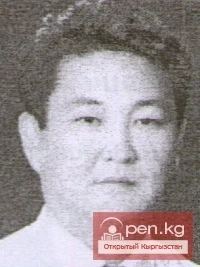
Batyraliev Talantbek Abdullayevich (1960)
Batyraliev Talantbek Abdullaevich (1960), Doctor of Medical Sciences (1999), Professor (2001)....
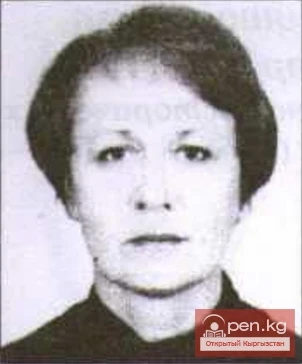
Olga Viktorovna Nikolskaya
Nikolskaia Olga Viktorovna (1948) Doctor of Technical Sciences (2000) Russian. Born in Frunze....
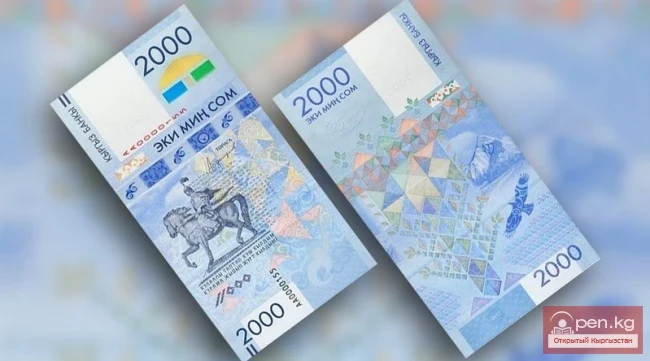
The 2,000 som banknote recognized as the best in the CIS and half of Europe.
The commemorative banknote with a denomination of 2,000 som has won a prestigious international...

Kyrgyzstan Became the Leader of the National Geographic Tourism Ranking
Kyrgyzstan has become the undisputed leader of the National Geographic Traveler Awards 2014 in the...
Enduro Motorcycle Journey in Kyrgyzstan. Enduro Kyrgyzstan
Motorcycle Journey Enduro Kyrgyzstan. Enduro Kyrgyzstan...
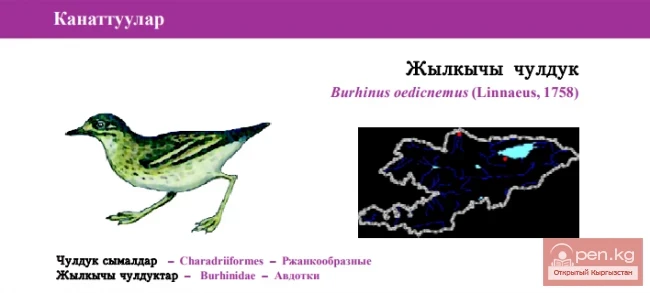
Avdotka / Zhilkychi Chuldik \ Eurasian Stone Curlew
Avdotka Status: V category, Vulnerable, VU: R, A1. At the same time, according to information from...
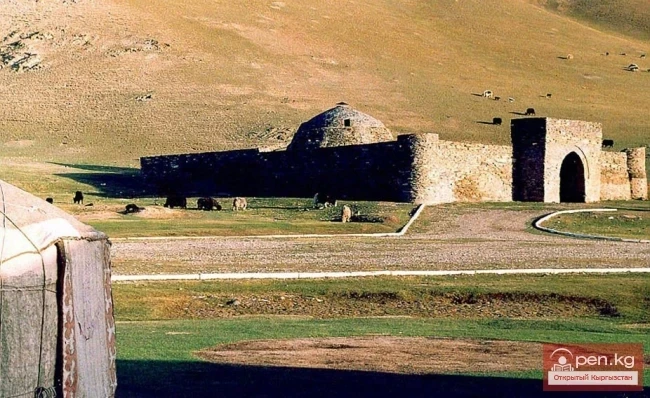
Attractions of Naryn Region
Historical-Architectural and Modern Attractions, as well as Natural-Ecological Complexes Cities...
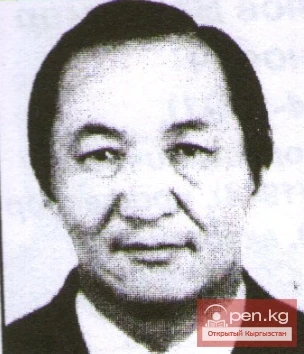
Ibraimov Abyt Ibraimovich
Ibraimov Abyt Ibraimovich (1948), Doctor of Biological Sciences (1985), Corresponding Member of...
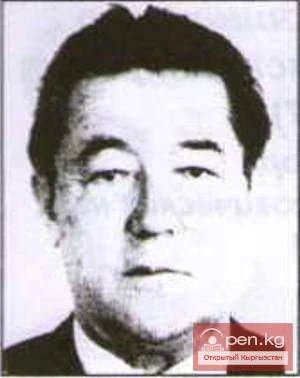
Mirrahimov Mirsaid Mirhamidovich
Mirrahimov Mirsayid Mirhamidovich (1927), Doctor of Medical Sciences (1965), Professor (1966),...

Mountain Goose / Too Kazy / Bar-headed Goose
Bar-headed Goose Status: Category VI, Near Threatened: R. A representative of the Tibetan species...
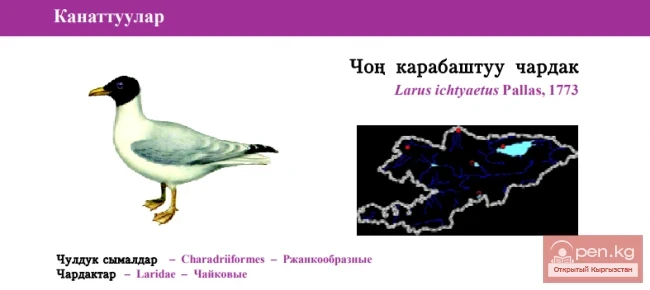
Black-headed Gull / Great Black-headed Gull
Great Black-headed Gull Status: VI, Near Threatened, NT: R. One of 6 species of the genus in the...
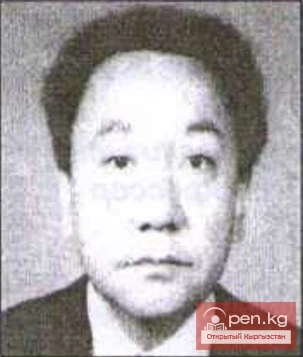
Sarbagišev Berdibek
Sarbagišev Berdibek (1929-2001), Doctor of Agricultural Sciences (1986) Kyrgyz. Born in the...
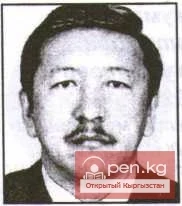
Jumataev Murat Sadyrbekovich (1957)
Dzhumataev Murat Sadyrbekovich (1957), Doctor of Technical Sciences (1993), Professor (1998),...
Manas Airport. Bishkek. Kyrgyzstan.
Airport Manas. Bishkek. Kyrgyzstan. Kyrgyzstan. Bishkek. Airport Manas...
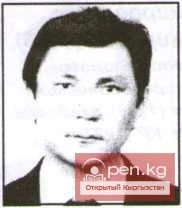
Bakassov Stalbek Sabdrakunovich (1950)
Bakasov Stalbek Sabdrakunovich (1950), Doctor of Medical Sciences (1995), Professor (1996)....
Cheerful Kyrgyzstan - Веселый Кыргызстан
An alternative for the tourism video of Kyrgyzstan. This video was shown in Sochi, where our...
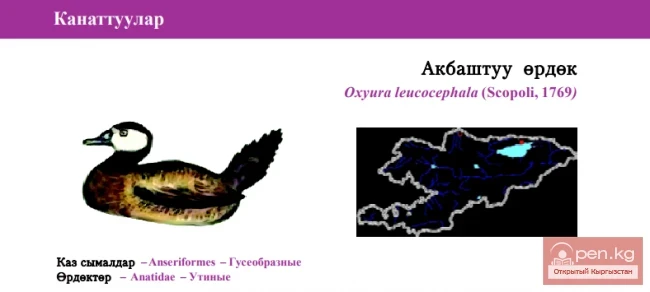
Savka / Akbashthuu ordok / White-headed Duck
Savka Status: IV category, Endangered, EN, 2bcde. Monotypic species....
Dance Flash Mob in Support of Social Justice in Kyrgyzstan
Popular dance teams Tumar, Let's Dance, and dancer Jan Voinov participated in a flashmob...
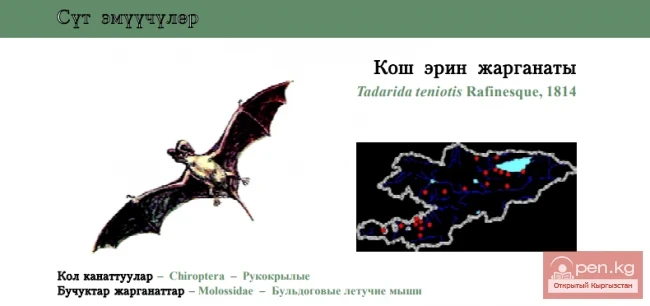
Broad-eared bat / Erin's bat / European Free-tailed bat
Broad-eared bat Status: Category VII, Lower Risk/least concerned, LR/lc....
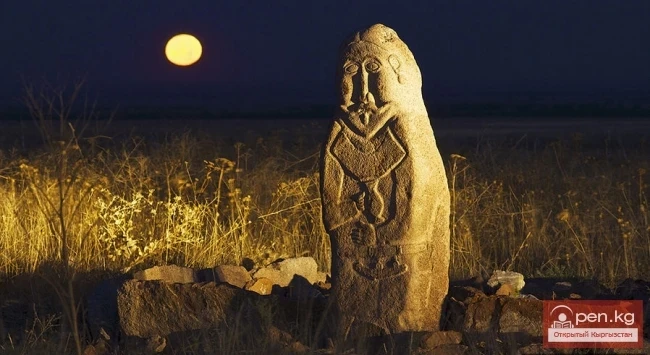
Attractions of the Chuy Region
Natural and ecological complexes: Shamsi Natural Complex Ala-Archa National Park Chon-Kemin Zone...
Dedicated to everyone who lived in Bishkek! Bishkek, Kyrgyzstan, Kyrgyz Republic, city of Bishkek
Bishkek, Orto-Tokoy Reservoir. September, 2013....
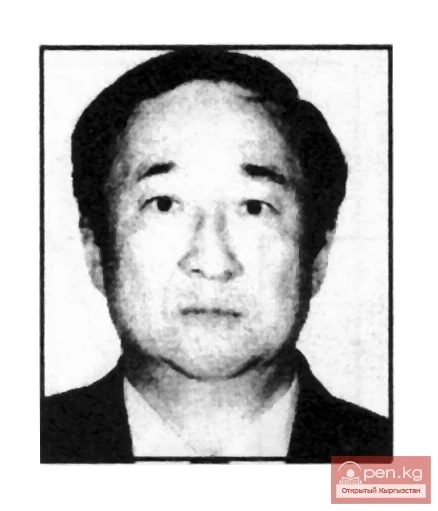
Aldashev Almaz Abdulkhayevich (1953)
Aldashev Almaz Abdulhaevich (1953), Doctor of Biological Sciences (1999), Professor, Corresponding...
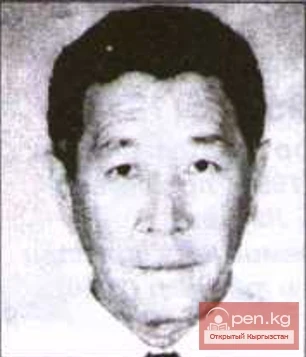
Almaz Sogombaevich Shanazarov
Shanazarov Almaz Sogombaevich (1943), Doctor of Medical Sciences (1999), Laureate of the State...
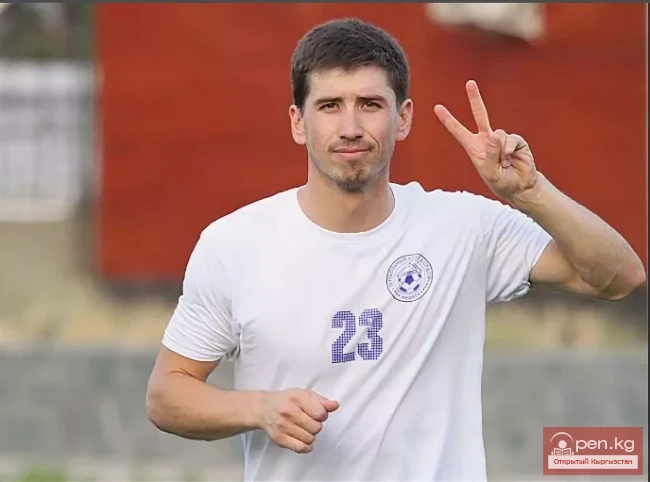
Myrlan Murzaev has joined a Cypriot club.
29-year-old Myrlan Murzaev will continue his career at a Northern Cyprus club The forward of the...
"Large Potholes". Pedestrians complain about the condition of the road at the bus stop
Residents of the village of Maevka have turned to the Call Center Kaktus.media for help,...

Kyrgyzstan Wins the National Geographic Traveler Contest for the Second Time
Kyrgyzstan has once again become a priority for Russian tourists. This year, the republic won in...
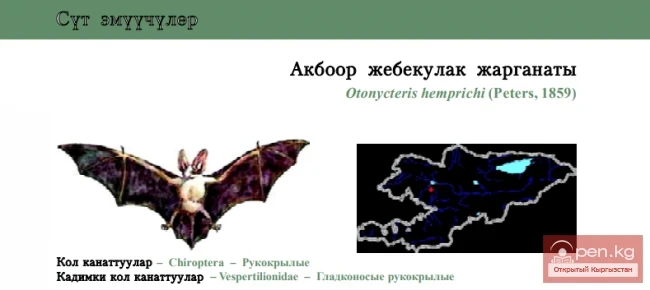
White-bellied Long-eared / Akboor Jebekulak Bat / Desert Long-eared, or Hemprich’s Arrow-eared, Bat
Desert Long-eared Bat Status: Category VII, Lower Risk - Least Concern, LR/lc....

Attractions of Jalal-Abad Region
Nature Parks and Reserves: Relict Walnut-Fruit Forests of Arslanbob Sary-Chelek Biosphere Reserve...
Toguz Bulak Ski Resort. Kyrgyzstan
The ski resort "Toguz-Bulak" is located on the northern slopes of the Kyrgyz Ridge, 40...

Kyrgyzstan Leads in the "Wellness Tourism" Category of the National Geographic Awards
Issyk-Kul topped the top 10 resorts of the former USSR for summer vacations of Russians....

The King of Ghana was fed Kyrgyz boorsoks in the USA.
The King of Ghana, Otumfuo Osei Tutu II, was fed with Kyrgyz boorsoks in the USA. The crowned...

Dancers from Kyrgyzstan won the tournament in the UAE
Dancers from Kyrgyzstan won at the international tournament held in Dubai (UAE). This was reported...
